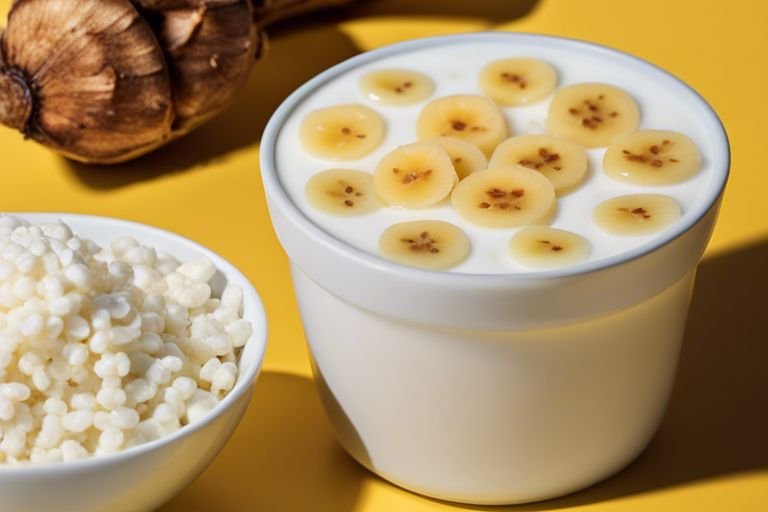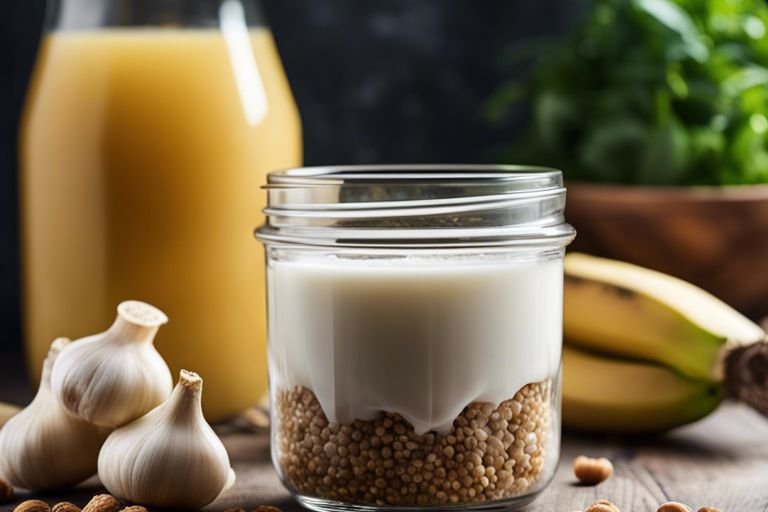You hold the key to a healthy gut! In this informative guide, we investigate into the world of probiotics and prebiotics, vital for a thriving digestive system. By understanding the importance of these beneficial bacteria and fibers, you can make simple yet impactful changes to your daily diet. Let’s explore how to incorporate these gut-friendly foods seamlessly into your meals, paving the way for improved digestion and overall well-being.
Key Takeaways:
- Probiotics for Gut Health: Incorporating probiotics into your daily diet can promote a healthy gut flora and improve digestive health.
- Prebiotics for Gut Health: Adding prebiotic-rich foods to your meals can help nourish the good bacteria in your gut and support overall gut health.
- Balanced Diet Approach: Achieving optimal gut health involves a balanced diet that includes a variety of probiotic and prebiotic foods, such as yogurt, kefir, bananas, garlic, onions, and whole grains.

Defining Gut Health
The gut, also known as the gastrointestinal tract, is a complex system responsible for digesting food, absorbing nutrients, and eliminating waste from the body. It is home to trillions of microbes, including bacteria, viruses, and fungi, collectively known as the gut microbiome. Maintaining a balance of these microorganisms is necessary for overall health and well-being.
The Importance of Gut Microbiome
Health experts often refer to the gut microbiome as the “forgotten organ” due to its crucial role in various bodily functions. These microorganisms help digest food, produce necessary vitamins, regulate the immune system, and even influence mood and mental health. Having a diverse and thriving gut microbiome is key to preventing disease and promoting overall wellness.
Common Gut Health Issues
With our modern lifestyles characterized by processed foods, chronic stress, and overuse of antibiotics, many people experience gut health issues such as bloating, gas, constipation, diarrhea, and indigestion. These symptoms may indicate an imbalance in the gut microbiome, leading to various health problems if left unaddressed.
To improve gut health and prevent issues, incorporating probiotics and prebiotics into your daily diet can help restore microbial balance and support a healthy gut. Probiotics are beneficial live bacteria found in fermented foods like yogurt, kefir, and sauerkraut, while prebiotics are indigestible fibers that serve as food for probiotics, found in foods like garlic, onions, and bananas.
Probiotics 101
Assuming you are looking to improve your gut health, understanding the role of probiotics is crucial. For more information on gut health and probiotics, check out Probiotics and Prebiotics.
What are Probiotics?
Any health-conscious individual looking to support their digestive system should know about probiotics. These live bacteria and yeasts are beneficial for your gut health. Probiotics work by balancing the friendly bacteria in your digestive system, aiding in digestion and supporting your immune system.
Types of Probiotics
An array of probiotic strains can benefit your health in various ways. This table breaks down the types of probiotics and their unique functions:
| Lactobacillus | Bifidobacterium |
| Saccharomyces boulardii | Streptococcus thermophilus |
| Bacillus |
- This variety in probiotic strains allows for targeted support for different health issues. Whether you are looking to boost your immunity, improve digestion, or enhance nutrient absorption, incorporating a diverse range of probiotics in your diet can be beneficial.
Benefits of Probiotics
Probiotics have several health benefits, including improving digestion, supporting the immune system, and even promoting mental health. By consuming probiotic-rich foods or supplements, you can maintain a healthy balance of gut bacteria, which is crucial for overall well-being.
To reap the benefits of probiotics, it’s crucial to consume a variety of strains regularly. Including probiotic-rich foods like yogurt, kimchi, sauerkraut, and kefir in your diet can help you maintain a diverse and healthy gut microbiome.
Prebiotics 101
What are Prebiotics?
Keep your gut happy with prebiotics! An crucial component of a healthy diet, prebiotics are non-digestible fibers that act as food for the good bacteria in your gut. By nourishing these beneficial bacteria, prebiotics help support a balanced and thriving gut microbiome, which plays a crucial role in overall health and well-being.
Types of Prebiotics
To boost your gut health, it’s important to include a variety of prebiotics in your diet. Here are some common types of prebiotics:
| Inulin | Found in foods like bananas, onions, and garlic |
| FOS (fructooligosaccharides) | Present in foods like whole grains, berries, and tomatoes |
| GOS (galactooligosaccharides) | Found in legumes, lentils, and chickpeas |
| Resistant Starch | Available in foods like cooked and cooled potatoes, green bananas, and legumes |
| Pectin | Found in fruits like apples, citrus fruits, and berries |
To maximize the benefits, aim to include a variety of prebiotics in your daily meals. After all, diversity is key in supporting a healthy gut microbiome.
Benefits of Prebiotics
On top of nourishing your gut bacteria, prebiotics offer several health benefits. They can help improve digestion, enhance nutrient absorption, boost immunity, and even support weight management. By fostering a healthy gut environment, prebiotics contribute to overall wellness and vitality.
Incorporating Probiotics into Your Diet
Probiotic-Rich Foods
Many fermented foods are rich sources of probiotics, which are beneficial bacteria that can support your gut health. One popular option is yogurt, especially varieties that contain live and active cultures. Kefir, a tangy dairy beverage, is another excellent choice. Other options include kimchi, sauerkraut, miso, and kombucha. These foods can easily be incorporated into your daily meals to help maintain a healthy balance of gut bacteria.
Probiotic Supplements
One convenient way to ensure you are getting enough probiotics is by incorporating supplements into your daily routine. Probiotic supplements come in various forms, such as capsules, powders, and chewable tablets. These supplements can be particularly beneficial for individuals who may not consume enough probiotic-rich foods regularly. It’s crucial to choose a high-quality supplement from a reputable brand to ensure effectiveness.
into your diet,
Tips for Choosing the Right Probiotic
Foods: When deciding on a probiotic supplement, consider the following tips to help you make the best choice for your needs. Look for a supplement that contains a variety of strains of beneficial bacteria, as diversity is key for gut health. Consider the colony-forming units (CFUs) in the supplement, aiming for a higher CFU count for maximum effectiveness. Additionally, check the expiration date to ensure that the live bacteria in the supplement will be active and beneficial.
- Choose a supplement with multiple strains of bacteria
- Look for a higher CFU count
- Check the expiration date
On the journey to better gut health, incorporating probiotics into your diet can play a significant role in supporting digestion, immunity, and overall well-being. Knowing how to choose the right probiotic for your needs is crucial for reaping the maximum benefits for your gut health.
Incorporating Prebiotics into Your Diet
Once again, focusing on your gut health means incorporating prebiotics into your daily diet. Prebiotics are types of fiber that promote the growth of beneficial bacteria in the gut, helping to improve digestion and overall health.
Prebiotic-Rich Foods
With the goal of boosting your prebiotic intake, consider including foods like bananas, onions, garlic, leeks, asparagus, and whole grains in your meals. These foods are rich in prebiotic fibers such as inulin, oligofructose, and resistant starch, which serve as fuel for the good bacteria in your gut.
Prebiotic Supplements
Prebiotics can also be taken in supplement form to ensure an adequate intake. These supplements typically contain concentrated forms of prebiotic fibers like inulin or oligosaccharides, which can be easily incorporated into your daily routine.
For instance, you can add prebiotic powder to your morning smoothie or mix prebiotic fiber into your favorite recipes to increase your daily prebiotic intake.
Tips for Choosing the Right Prebiotic
- Choosing prebiotic supplements with minimal added ingredients
- Opting for prebiotic sources that agree with your digestive system
Plus, aim to select prebiotics that are derived from natural sources and have undergone minimal processing to retain their beneficial properties. Any artificial additives or excessive processing may diminish the prebiotic benefits.

Combining Probiotics and Prebiotics
The Synergy Effect
To optimize gut health, it’s imperative to combine probiotics and prebiotics in your daily diet. Probiotics are live bacteria that promote a healthy gut environment, while prebiotics are plant fibers that feed these beneficial bacteria. When taken together, they create a synergistic effect that enhances the growth and activity of good bacteria in the gut.
Creating a Balanced Gut Microbiome
One key benefit of combining probiotics and prebiotics is the ability to create a balanced gut microbiome. Any imbalance in the gut bacteria can lead to various health issues, including digestive problems, weakened immunity, and inflammation. By incorporating both probiotics and prebiotics into your diet, you can support the diversity and overall health of your gut microbiota.
Plus, a balanced gut microbiome is crucial for overall health and well-being. It can help improve digestion, enhance nutrient absorption, and even boost mood and mental clarity. By nurturing a diverse and balanced gut microbiome through probiotics and prebiotics, you can support your body’s optimal functioning and overall health.
Sample Meal Plans
Any well-rounded meal plan focused on gut health should include foods rich in probiotics and prebiotics. Incorporate fermented foods like yogurt, kefir, kimchi, and sauerkraut for probiotics, and include prebiotic-rich foods such as garlic, onions, leeks, bananas, and asparagus. By including a variety of these foods in your daily meals, you can ensure that you are nourishing your gut microbiome with the right balance of beneficial bacteria and fiber.
For instance, start your day with a breakfast bowl of Greek yogurt topped with sliced banana, chia seeds, and a drizzle of honey for a dose of probiotics and prebiotics. For lunch, enjoy a salad with mixed greens, cherry tomatoes, grilled asparagus, and a sprinkle of almonds for added crunch and prebiotic fiber. And for dinner, savor a serving of roasted salmon with a side of sautéed garlic spinach to round out your day with a nutrient-packed meal that supports your gut health goals.
Summing up
As a reminder, incorporating probiotics and prebiotics into your daily diet can have significant benefits for your gut health. Probiotics help introduce good bacteria into your gut, while prebiotics serve as food for these beneficial microbes. By including a variety of probiotic and prebiotic-rich foods such as yogurt, kefir, sauerkraut, and bananas in your diet, you can support a healthy gut and overall well-being.
Bear in mind, variety is key when it comes to promoting a diverse and thriving gut microbiome. So, experiment with different types of probiotic and prebiotic foods, listen to your body’s responses, and find what works best for you. Small changes in your daily diet can lead to significant improvements in your gut health, contributing to a healthier and happier you in the long run.
FAQ
Q: Why is gut health important?
A: Gut health is crucial because it plays a significant role in our overall well-being. A healthy gut promotes better digestion, boosts our immune system, and even impacts our mental health.
Q: What are probiotics and prebiotics?
A: Probiotics are live beneficial bacteria that can be found in certain foods or supplements. They help maintain a healthy balance of gut bacteria. Prebiotics, on the other hand, are non-digestible fibers that serve as food for probiotics, helping them thrive in our gut.
Q: How can I incorporate probiotics and prebiotics into my daily diet?
A: You can incorporate probiotics into your diet by consuming fermented foods like yogurt, kefir, sauerkraut, and kimchi. Prebiotics can be found in foods such as bananas, onions, garlic, and whole grains. Consider including a variety of these foods in your meals to support your gut health goals.
